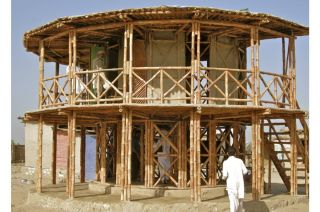
www.buildingsandcities.org/insights/research-pathways/household-energy-consumption.html
Making an Impact on Household Energy Consumption

RESEARCH PATHWAY: personal reflections on a career in research
Kirsten Gram-Hanssen (Aalborg University) reflects on the key drivers in her research career moving from engineering to work as a social scientist to understand inhabitants' energy consumption. Situated for many years within a governmental research institute dedicated to applied research, she highlights the challenges that researchers face for influencing public policy.
My interest in energy started in childhood during the energy crisis of the 1970s, and in high school I created a project on energy efficiency and prosumption in detached houses. This may give a false impression that my research career was very straightforward as my last 20 years of research has been on households' energy consumption. However, my career was not straightforward!
A detour
I went to a technical university in 1984, mainly because my feminist approach led me to study engineering just because this was a male dominated field. At that time, energy was not understood as being within a social context. This led me to question what technology is and how it relates to society, so I moved to the social science department at the technical university. Some questions of how technology and society shaped each other were answered here, but others were not. A practical question intrigued me: what is the best way to handle straw from farm fields (either making it into biogas or plough it back into the soil to improve fertility)? This started a long detour in my research career. In my master's degree, I worked on views of nature and ethics. In my PhD, I used this approach to compare different types of wastewater treatment. Situated at a social science department at a technical university, I did a PhD with a humanities approach, supervised by a young economist, Inge Røpke, and supported by a research environment of feminist thinkers. At that time, the technical university allowed students to pursue their own curriculum - something that is not possible today. I thought my PhD achieved some major insights, though soon I realized that doing a PhD does not change anything in the real world. Furthermore, I felt in a vacuum of not belonging to a discipline, not really being an engineer, a social scientist, a philosopher, or a feminist researcher.
A research career in understanding energy consumption
Pursuing a scientific career (then as well as now) implies short time employment. With two small children I was close to giving up, but luckily, I applied for a job as senior researcher at the Danish Building Research Institute (SBI). Only two years after my PhD I had a permanent position, perhaps more by luck and coincidence. Situated at a governmental research institute dedicated to applied research shaped my career, and energy consumption in the built environment was a path easier to fund compared to others. Although disappointed about my PhD never really doing anything (but what had I expected?), I started a career which happily aligned with my early interest in energy.
At SBI, I met Hal Wilhite who became a major inspiration with his unique approach combining social science research and energy policy. My aim was always to deliver results which could be useful in a policy context. So, did I succeed in that? To be honest, I do not think this was my greatest achievement. Raising funding and getting attention nationally was never the big issue. In some years I had several frontpage stories in national Danish newspapers and broadcasting. Stories about 'who consumes how much and for what purpose' were easy to sell to journalist. However, funding and publicity do not necessarily lead to changes in policy.
This can also be illustrated by the work on energy labels, energy retrofitting, rebound effect and changing norms of comfort. My research group collaborated with a broader international research community. To mention just a few, these include Majcen et al. (2013); Sunikka-Blank & Galvin (2012). Within this research context, from 2013 and onwards I led a major five-year research project, including researchers from social sciences, humanities and engineering called UserTEC.1 The project sought explanations and solutions to why the large technical potential for energy savings in the housing sector were not being realized. In terms of international collaboration and publications, the project was a success, specifically by relating technical and social understandings of how norms of comfort change together with the introduction of new technologies.2
In terms of impact on policy, the UserTEC project was less of a success. The results did not fit with the present policy context, even though the project team and advisory board did include both practitioners and policymakers. Energy and building authorities still wanted calculations on theoretical potentials of energy refurbishment despite the known shortcomings of such calculations. A key problem was the results could easily become subverted and used by those who are against a green transition, energy retrofitting and efficiency improvement. Another key problem is that changing a whole culture of professionals working in the administration takes time and are not achieved in one single project. Although efficiency is part of the solution, many other factors must be also included, notably, ways of reducing demand. Our research was better at pointing out the failure of existing policy, rather than suggesting new policies or actions. Furthermore, the appropriate actions were pertinent to other ministries and agencies rather than those dedicated to energy.
Understanding or saving the world?
Success in fundraising and publications means that our research group3 grew to 15 people. Funding is probably available for continued growth. A fundamental question that the research teams asks is: what is the right size and what should determine this? University leaders always want growth and the problems we address continue to be salient. However, I am losing faith that more of the same research is the answer. What type of research can deliver results to a policy framework that are not really open for fundamental changes?
While being frustrated about these questions, I realized that a major driver of my research is knowledge seeking. This allows me to grasp and combine things which I find are needed to understand the world.
Supported and encouraged by my university in 2017 I wrote a European Research Council (ERC) advanced grant application. In 2007 the Danish governmental research institute (SBI) became part of Aalborg University, and this made it easier for me to pursue more basic research compared to previously primarily doing applied research. Still, as an applied researcher with no well-defined discipline, my expectation for getting one of these prestigious basic research grants was not high, and my surprise and joy were great when it was awarded.4 For many years, my research has been inspired by theories of practice (Gram-Hanssen 2010) as developed by Schatzki (1996), Shove et al. (2012) and Warde (2005) amongst others. In my previous work I saw my role as translating theory into applied research within the built environment. Now, I created a new role to develop theories. While writing the application and actually doing the research, I realized that I have returned to some of my old questions from my PhD of understanding ethics, views of nature and technology (Gram-Hanssen 2019, 2021).
Some advice
My advice to others is to approach the act of writing a grant application as rewarding in itself. This can allow you to develop what you would like to work on, no matter if you get the grant or not. Writing an ERC application (or similar) can be seen as designing your future research career, allowing yourself time to develop ideas you really would like to work on. Should you not get the grant, you still have the ideas for other applications and future work.
My PhD was in-between several disciplines, not really linked to a research group or an international agenda. Reflecting on this, one of my conclusions is that breaking new ground as a PhD is too difficult. This is because one needs to link the research, situate it, and communicate it into a community who can discuss, criticize, and develop it. My PhD ended up on a shelf, whereas my later research has been cited, criticised and used.
My split background working as a sociologist, and partly educated as an engineer in the end turned out to be an advantage. Also, the fact that I had found some research environments to support my in-between discipline, specifically the European Sociological Association's (ESA) Network on Sociology of Consumption and the European Council of an Energy Efficient Economy (eceee) helped. Today many educational and research environments are transdisciplinary. Still, young researchers will find themselves at times on the edge of what the established researchers work on, as this is the nature of how research develops.
What advice would I give to these young researchers? I would like to say "follow what motivates you", pursue the questions which you think just must be answered. However, my own career also shows that being part of a community, learning and following common discussions are necessary. Following the money may be necessary too: it is possible to do this and be motivated by both problems and doubts.
Notes
1. For more information about UserTEC project, see https://www.usertec.aau.dk/
2. One of the publications was a special issue of Building Research and Information entitled "Energy performance gaps: promises, people, practices", which is illustrative of the work in UserTEC https://www.tandfonline.com/toc/rbri20/46/1
3. Sustainable Cities and Everyday Practices at Aalborg University in Copenhagen, see www.en.build.aau.dk/research/town-housing-and-property/sustainable-cities-and-everyday-practice
4. For more information on my ERC advanced grant eCAPE see: www.ecape.aau.dk
References
Gram-Hanssen, K. (2010). Residential heat comfort practices: understanding users. Building Research & Information, 38(2), 175-186. https://doi.org/10.1080/09613210903541527
Gram-Hanssen, K. (2019). Automation, smart homes and symmetrical anthropology: non-humans as performers of practices? In C. Maller & Y. Strengers (Eds.), Social Practices and Dynamic Non-Humans: Nature, Materials and Technologies (235-253). Springer International Publishing. https://doi.org/10.1007/978-3-319-92189-1_12
Gram-Hanssen, K. (2021). Conceptualising ethical consumption within theories of practice. Journal of Consumer Culture, 21(3), 432-449. https://doi.org/10.1177/14695405211013956
Majcen, D., Itard, L. C. M., & Visscher, H. (2013). Theoretical vs. actual energy consumption of labelled dwellings in the Netherlands: Discrepancies and policy implications. Energy Policy, 54, 125-136. https://doi.org/10.1016/j.enpol.2012.11.008
Schatzki, T. R. (1996). Social Practices: A Wittgensteinian Approach
to Human Activity and the Social. Cambridge University Press.
Shove, E., Pantzar, M., & Watson, M. (2012). The Dynamics of Social Practice Everyday Life and How it Changes. SAGE.
Sunikka-Blank, M., & Galvin, R. (2012). Introducing the prebound effect: The gap between performance and actual energy consumption. Building Research & Information, 40(3), 260-273. https://doi.org/10.1080/09613218.2012.690952
Warde, A. (2005). Consumption and theories of practice. Journal of Consumer Culture, 5(2), 131-153. https://doi.org/10.1177/1469540505053090
Latest Peer-Reviewed Journal Content
Energy sufficiency, space temperature and public policy
J Morley
Living labs: a systematic review of success parameters and outcomes
J M Müller
Towards a universal framework for heat pump monitoring at scale
J Crawley, L Domoney, A O’Donovan, J Wingfield, C Dinu, O Kinnane, P O’Sullivan
Living knowledge labs: creating community and inclusive nature-based solutions
J L Fernández-Pacheco Sáez, I Rasskin-Gutman, N Martín-Bermúdez, A Pérez-Del-Campo
A living lab approach to co-designing climate adaptation strategies
M K Barati & S Bankaru-Swamy
Mediation roles and ecologies within resilience-focused urban living labs
N Antaki, D Petrescu, M Schalk, E Brandao, D Calciu & V Marin
Negotiating expertise in Nepal’s post-earthquake disaster reconstruction
K Rankin, M Suji, B Pandey, J Baniya, D V Hirslund, B Limbu, N Rawal & S Shneiderman
Designing for pro-environmental behaviour change: the aspiration–reality gap
J Simpson & J Uttley
Lifetimes of demolished buildings in US and European cities
J Berglund-Brown, I Dobie, J Hewitt, C De Wolf & J Ochsendorf
Expanding the framework of urban living labs using grassroots methods
T Ahmed, I Delsante & L Migliavacca
Youth engagement in urban living labs: tools, methods and pedagogies
N Charalambous, C Panayi, C Mady, T Augustinčić & D Berc
Co-creating urban transformation: a stakeholder analysis for Germany’s heat transition
P Heger, C Bieber, M Hendawy & A Shooshtari
Placemaking living lab: creating resilient social and spatial infrastructures
M Dodd, N Madabhushi & R Lees
Church pipe organs: historical tuning records as indoor environmental evidence
B Bingley, A Knight & Y Xing
A framework for 1.5°C-aligned GHG budgets in architecture
G Betti, I Spaar, D Bachmann, A Jerosch-Herold, E Kühner, R Yang, K Avhad & S Sinning
Net zero retrofit of the building stock [editorial]
D Godoy-Shimizu & P Steadman
Co-learning in living labs: nurturing civic agency and resilience
A Belfield
The importance of multi-roles and code-switching in living labs
H Noller & A Tarik
Researchers’ shifting roles in living labs for knowledge co-production
C-C Dobre & G Faldi
Increasing civic resilience in urban living labs: city authorities’ roles
E Alatalo, M Laine & M Kyrönviita
Co-curation as civic practice in community engagement
Z Li, M Sunikka-Blank, R Purohit & F Samuel
Preserving buildings: emission reductions from circular economy strategies in Austria
N Alaux, V Kulmer, J Vogel & A Passer
Urban living labs: relationality between institutions and local circularity
P Palo, M Adelfio, J Lundin & E Brandão
Living labs: epistemic modelling, temporariness and land value
J Clossick, T Khonsari & U Steven
Co-creating interventions to prevent mosquito-borne disease transmission in hospitals
O Sloan Wood, E Lupenza, D M Agnello, J B Knudsen, M Msellem, K L Schiøler & F Saleh
Circularity at the neighbourhood scale: co-creative living lab lessons
J Honsa, A Versele, T Van de Kerckhove & C Piccardo
Positive energy districts and energy communities: how living labs create value
E Malakhatka, O Shafqat, A Sandoff & L Thuvander
Built environment governance and professionalism: the end of laissez-faire (again)
S Foxell
Co-creating justice in housing energy transitions through energy living labs
D Ricci, C Leiwakabessy, S van Wieringen, P de Koning & T Konstantinou
HVAC characterisation of existing Canadian buildings for decarbonisation retrofit identification
J Adebisi & J J McArthur
Simulation and the building performance gap [editorial]
M Donn
Developing criteria for effective building-sector commitments in nationally determined contributions
P Graham, K McFarlane & M Taheri
Join Our Community

The most important part of any journal is our people – readers, authors, reviewers, editorial board members and editors. You are cordially invited to join our community by joining our mailing list. We send out occasional emails about the journal – calls for papers, special issues, events and more.
We will not share your email with third parties. Read more



Latest Commentaries
COP30 Report
Matti Kuittinen (Aalto University) reflects on his experience of attending the 2025 UN Conference of the Parties in Belém, Brazil. The roadmaps and commitments failed to deliver the objectives of the 2025 Paris Agreement. However, 2 countries - Japan and Senegal - announced they are creating roadmaps to decarbonise their buildings. An international group of government ministers put housing on the agenda - specifying the need for reduced carbon and energy use along with affordability, quality and climate resilience.
Building-Related Research: New Context, New Challenges
Raymond J. Cole (University of British Columbia) reflects on the key challenges raised in the 34 commissioned essays for Buildings & Cities 5th anniversary. Not only are key research issues identified, but the consequences of changing contexts for conducting research and tailoring its influence on society are highlighted as key areas of action.